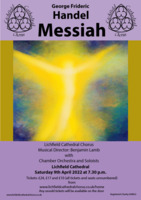Handel's Messiah ()
Two years after the first performance of Messiah in Dublin in 1742, Horace Walpole, 4th Earl of Orford and son of Sir Robert Walpole wrote: “Handel’s oratorios thrive abundantly — for my part, they give me an idea of heaven, where everybody is to sing whether they have voices or not”. Lichfield Cathedral Chorus certainly has no shortage of voices! Come and join us as we mark our return to large-scale performances and prepare for the Easter season with one of the best known and most loved choral works of them all. Ben Lamb directs the newly formed Lichfield Camerata, the massed voices of Lichfield Cathedral Chorus and soloists in an unmissable evening of reflective and uplifting music.
We sang:
- Messiah, HWV 56 (1742) — Handel
Venue
Lichfield Cathedral, The Close, Lichfield, WS13 7LD [map]
« Carol Concert with Salvation Army Cannock Citadel Band (Dec 2021) ‖ Brahms: Ein deutsches Requiem (Jun 2022) »
Reviews
Messiah
What a joyous occasion it was — back in the Cathedral for a wonderful performance of Handel’s Messiah given by the Lichfield Cathedral Chorus with the new instrumental ensemble Lichfield Camerata. The sense of great joy permeated the evening…the joy of being back together, socially un-distanced, the joy of feeling totally comfortable (both performers and listeners) with the excellent choice of music, and the sheer joy of singing together again to a most appreciative audience.
The structure of the work held together well, having been cleverly edited by conductor Ben Lamb to shorten it somewhat without destroying either the musical or textual flow. All of the soloists had a fair crack of the whip, and the resulting concert of just under two hours’ music felt just right for the occasion. And how lovely to be able to read the Right Reverend Pete Wilcox’s superb programme notes from the 2006 performance, which were truly enlightening. He emphasised the unique qualities of the text, and this was indeed the foundation of Ben’s decisions on selection and delivery of the text which were paramount throughout.
Messiah is so well known that it would be all too easy to slip into old familiar ways, but new ideas of interpretation kept appearing. The very willing chorus took on board the light and effortless rapid runs which Ben was clearly wanting, in choruses such as For unto us and His yoke is easy, and the basses in particular were notable for their precision and lightness. Ben’s attention to the real meaning of the words was well demonstrated in He trusted in God, where the chorus became truly involved in the narrative, almost like the use of the chorus in Bach’s great Passions. Some relaxed rhythms also lent themselves to the text…the sometimes tortuously executed dotted rhythms of Behold the Lamb of God were here smoothed out into a lilting flow which seemed much more natural and textually appropriate, as was the soprano aria Rejoice greatly, which followed on from a beautifully executed Glory to God chorus with a delicious light ending.
The ensemble, though small, was in excellent balance with the choir. The fact that they were on the floor, rather than on a platform and thus blocking the sound from the singers, also made for a significant improvement in the balance. After a slightly sluggish start, the ensemble quickly settled into a cohesive group, and the imaginative use of solo players for some of the aria accompaniments was inspired and gave freedom to the excellent players. There was a lightness of touch amongst the players as well as the chorus, with well-blended trumpets where required and some lovely warm oboe playing, underpinned by Liam Condon’s sensitive continuo.
The first soloist we heard, tenor William Edwards, immediately set a fresh, open tone to his performance with a clean, forward sound and excellent diction… it would be interesting to hear him take the role of the Evangelist in other works some time. Equally clear and pleasantly light was Fran Ambrose’s bass, singing the arias which particularly suited his range. Counter-tenor Daniel Keating-Roberts had an even, warm sound, if lacking somewhat in variety, and there were occasional issues with tuning and some poor communication, his eyes being firmly on the copy rather than the audience. Outstanding amongst the soloists, however, was Caroline Halls, who gave a fresh and effortless account of her wide-ranging recitatives and arias, and produced some exquisitely executed and appropriate baroque ornamentation. She was indeed a delight both to listen to and to watch. The innovative idea of using the four of them as a quartet to sing Since by man came death was inspired, and here the counter-tenor, and indeed all of them, blended perfectly, to be followed by the chorus bursting in with “by man came also the resurrection of the dead”.
This event was not only a welcome return to the familiar in many ways, but also a newly meaningful and carefully curated performance by these musicians, who to a man and woman helped us to feel truly thrilled by the experience of great live music once again. This was not just a joyous occasion…it was a memorably fresh approach to a familiar work given by a dedicated choir who have weathered the storm and come out invigorated and refreshed.
Megan Barr, April 2022
